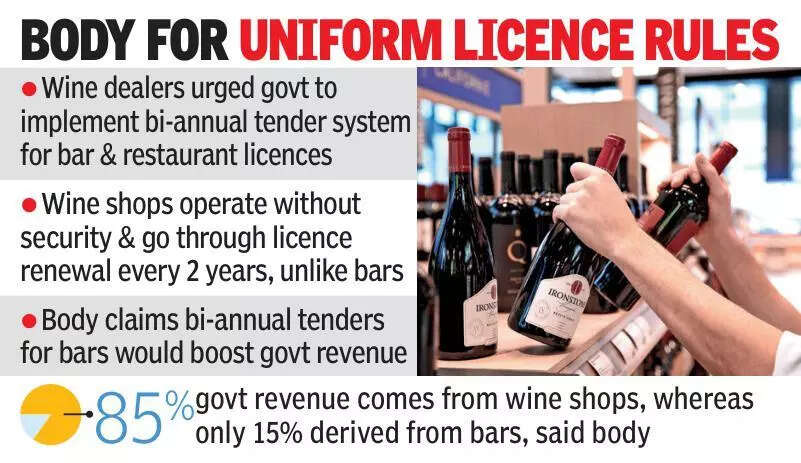Implement bi-annual tender system for bar licences: Wine dealers to govt

Hyderabad: The Telangana Wine Dealers Association has urged the state govt to introduce a bi-annual tender system for bar and restaurant licences on the lines of wine shops, claiming that they are not misusing their existing licences.
Addressing a press conference, association president D Venkateswara Rao said: “The wine shops are operating without security and have to participate in a tender process for their licences every two years.”
He argued that the same rules should apply to bars in terms of their licensing.
Rao pointed out that wine shops face uncertainty regarding the renewal of their licences after two years, while bars enjoy annual renewals. He stressed that the introduction of biennial tenders for bar licences would benefit the govt financially.
In a recent auction, more than 60 applications were received for each shop licence. Rao noted that about 85% of the govt’s revenue comes from over 2,000 wine shops, while only about 15% comes from nearly 1,000 bars.
Rao claimed that there was no misuse of licensed premises. “Many customers prefer permit rooms because they allow the purchase of liquor at MRP prices, making them a more economical choice than bars,” he noted.
He claimed that bars offer several advantages, including operational hours, and alleged that some bars close their kitchens and only sell liquor in varying quantities, thereby reducing the income of wine shops.
The association has also called on the govt to reverse its decision to allow bars to sell pint, nip and dip.
“The bars and restaurants not only sell liquor by the peg to their dining customers, but also offer sealed bottles of liquor and beer at MRP prices to takeaway customers. This effectively allows them to function as both a bar and a retail outlet,” Rao said.
The association also expressed concern that bars do not maintain adequate restaurant facilities, even though such establishments are required to operate with a valid GST registration to obtain a B2 licence.
“Bars usually serve only snacks to reduce operating costs, yet they continue to portray themselves as victims of financial distress. In addition, hygiene standards in many bars that claim to operate as restaurants are inadequate, posing health risks to patrons,” he said.
Addressing a press conference, association president D Venkateswara Rao said: “The wine shops are operating without security and have to participate in a tender process for their licences every two years.”
He argued that the same rules should apply to bars in terms of their licensing.
Rao pointed out that wine shops face uncertainty regarding the renewal of their licences after two years, while bars enjoy annual renewals. He stressed that the introduction of biennial tenders for bar licences would benefit the govt financially.
In a recent auction, more than 60 applications were received for each shop licence. Rao noted that about 85% of the govt’s revenue comes from over 2,000 wine shops, while only about 15% comes from nearly 1,000 bars.
Rao claimed that there was no misuse of licensed premises. “Many customers prefer permit rooms because they allow the purchase of liquor at MRP prices, making them a more economical choice than bars,” he noted.
He claimed that bars offer several advantages, including operational hours, and alleged that some bars close their kitchens and only sell liquor in varying quantities, thereby reducing the income of wine shops.
The association has also called on the govt to reverse its decision to allow bars to sell pint, nip and dip.
“The bars and restaurants not only sell liquor by the peg to their dining customers, but also offer sealed bottles of liquor and beer at MRP prices to takeaway customers. This effectively allows them to function as both a bar and a retail outlet,” Rao said.
The association also expressed concern that bars do not maintain adequate restaurant facilities, even though such establishments are required to operate with a valid GST registration to obtain a B2 licence.
“Bars usually serve only snacks to reduce operating costs, yet they continue to portray themselves as victims of financial distress. In addition, hygiene standards in many bars that claim to operate as restaurants are inadequate, posing health risks to patrons,” he said.
















